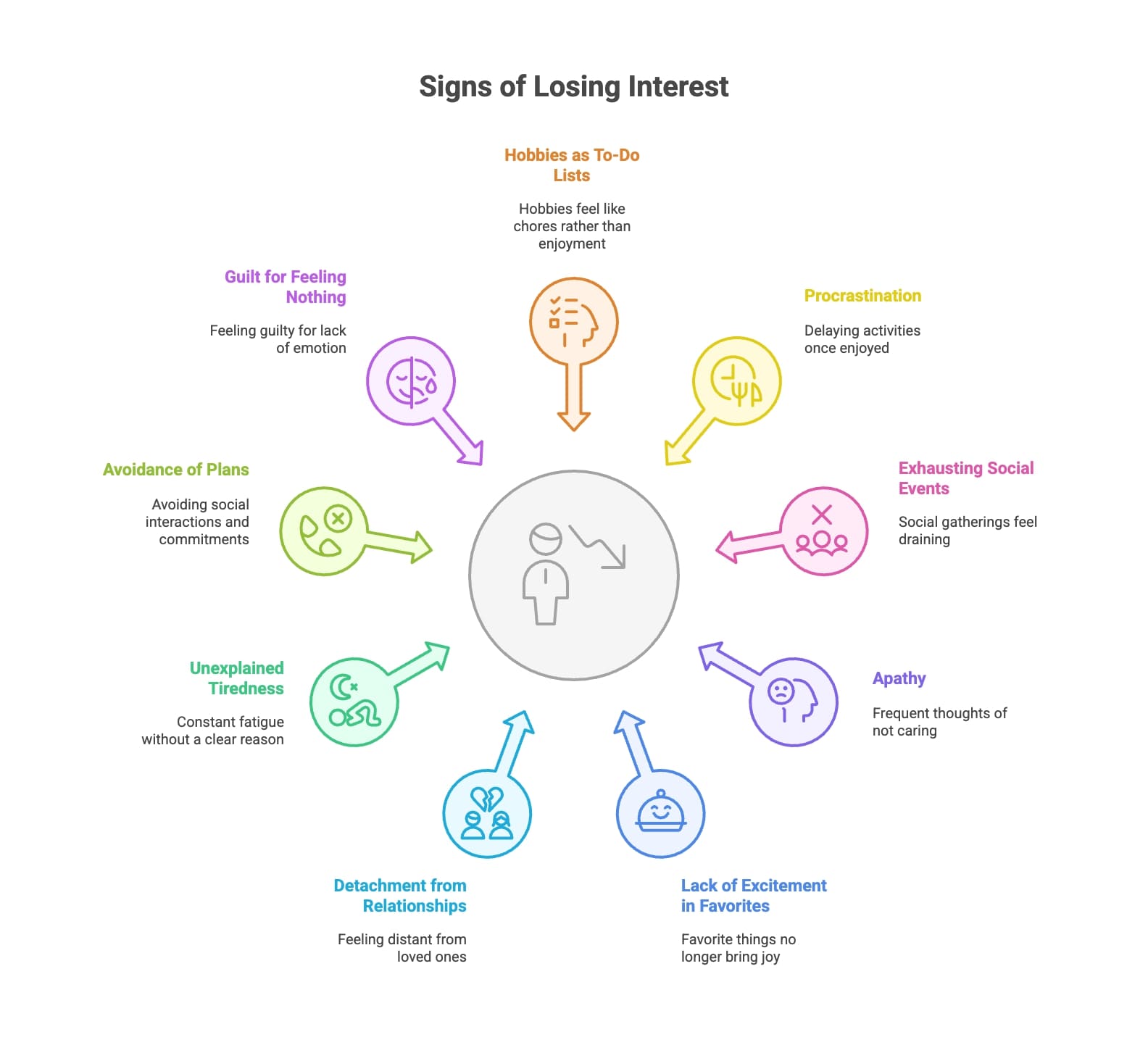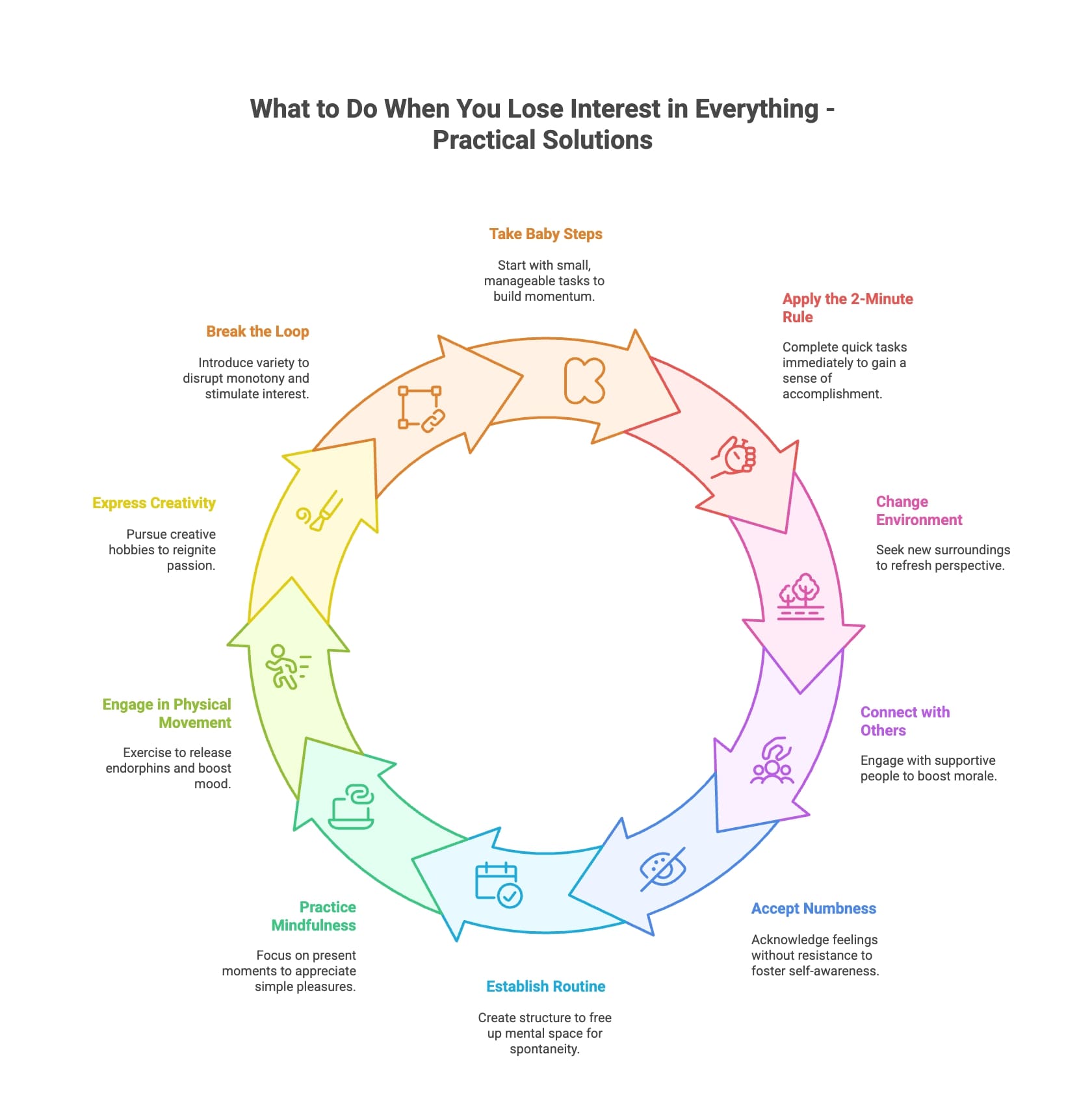Amaha / / / When You’re Just... Not Feeling Anything Anymore: Understanding Why You're Losing Interest in Everything
ARTICLE | 6 MINS READ
When You’re Just... Not Feeling Anything Anymore: Understanding Why You're Losing Interest in Everything
Published on
6th Oct 2025
Dr Divya G Nallur
MD Psychiatry

Feeling like you're just…browsing through life, like just surviving vs actually Living and Enjoying? Like the vibrant colours of life have faded to a dull grey? If you've been muttering to yourself, "why am I losing interest in everything," you're not alone.
According to a 2024 survey by the Indian Journal of Psychiatry, over 38% of urban Indians between 18-45 report feeling emotionally numb or uninterested in the things that once made them tick. Work, friends, family, even hobbies start to feel like background noise. Nearly 40% of Indians experience periods where they lose interest in activities they once enjoyed. This phenomenon, called ‘anhedonia’ in medical terms, affects millions worldwide.
"The loss of interest in previously enjoyable activities is often our mind's way of signaling that something deeper needs attention," explains Dr Sharadhi C, a Mumbai-based psychiatrist with over 5 years of experience working at Amaha treating mood disorders.
What Actually Happens When You Lose Interest in Everything?
When you're losing interest in everything, it's not just about feeling boredom. Your brain changes how it processes pleasure and motivation. The neurotransmitters that make you feel excited about activities (dopamine, serotonin, and norepinephrine) start malfunctioning. It's often a profound sense of apathy that can seep into every corner of your life.
I remember talking to my cousin Raj last Diwali. He confessed he didn't even feel excited about the festival anymore. "Even the fireworks felt meh," he said. That's when I realized how common this actually is in our fast-paced lifestyle.
Signs You are Losing Interest in Everything
1. Your hobbies feel like a To-do list
2. You delay and procrastinate on things you used to enjoy
3. Social functions and meet-ups feel exhausting rather than energizing
4. You catch yourself thinking "I don't care" more often
5. Even your favorite restaurant and cuisine doesn't excite you anymore
6. You feel detached from your relationships
7. You’re constantly “tired” but can’t explain why
8. You avoid plans, calls, and conversations
9. You feel guilty for not feeling anything


Lost Interest in Everything Lately?
Losing interest in what you once loved? Take a quick assessment to understand if it’s sadness or depression.
Why Am I Losing Interest in Everything? The Real Reasons and Causes
1. Expectation mismatch creating pressure
Living in India means dealing with constant pressure. From family expectations to career competition, we're always under some form of stress. Sometimes our mind just says, "You know what? I'm taking a break from caring about anything."
2. Burnout
Burnout is that feeling when you've been slogging away, working late nights, juggling family responsibilities, and maybe even dealing with an irritating boss? It’s not just physical exhaustion; it’s mental and emotional fatigue so deep, it leaves you feeling utterly depleted. When you're constantly running on empty, there's just no fuel left for joy or passion.
3. Digital Overwhelm
We're constantly bombarded with information. Podcasts, Youtube, Instagram stories, WhatsApp forwards, work emails and Slack - it's exhausting. Your brain gets overstimulated and shuts down its pleasure centers as a protective mechanism.
4. Constant comparison
Social media makes us compare our behind-the-scenes with everyone else's movie premiere. When you're constantly measuring yourself against others, genuine interest in your own life can fade away.
5. Hormonal or Health Imbalances
Poor sleep, irregular eating habits, and lack of physical activity all contribute to losing interest in everything. In our fast-food culture, we often ignore how nutrition affects our mood.
6. Lack of purpose or direction
We are often brought up with clear paths laid out for us engineering, medicine, civil services. But what happens if those paths don't resonate with your soul? What if you're stuck in a job that doesn't challenge you or a routine that feels monotonous? A sense of aimlessness can easily lead to a pervasive feeling of disinterest.
7. Chronic Stress, Anxiety or Depression
Living in a high-alert state for too long can desensitise your emotional system. It’s like emotional overload leading to a system shutdown.

Get 15% OFF on First 3 Sessions - Use Code: FIRST15
Therapy works best when it’s approached with consistency. Take those first few steps with confidence, so you can begin your mental health journey. **Limited Period Offer
What to Do When You Lose Interest in Everything
You’re here and reading this. That’s the first step. And that counts. But what now? How do you bring back that spark in your life?
Take Baby steps
Don't try to fix everything at once. That's like trying to eat a whole elephant in one bite. Instead, pick one tiny thing you used to enjoy and give it just five minutes of your time.
The 2-Minute Rule
If anything takes less than two minutes, just do it. Revert to that text. Water the plant. Make your bed. These micro-actions can slowly reignite your interest in larger activities.
Change Your Environment
Sometimes, a change of place and location is all you need. If you're working from home, try a different room. Go to a local cafe. Take a walk in your neighbourhood. Fresh perspectives can spark dormant interests.
Connect with Others
Humans are social creatures. Even if you don't feel like it, spending time with people who genuinely care about you can help. In Indian culture, we're blessed with strong family and friendship bonds.
Don't Fight the Numbness
Trying to force joy or excitement often backfires. Accept the dullness. Label it. “I feel disconnected right now.” That’s self-awareness, not defeat.
Practical Solutions When Losing Interest in Everything
You don't need a complete life overhaul. You need small changes that are doable even when you're not feeling quite motivated.
The Power of Routine
Routines sound boring when you're already bored. Routines create mental space for spontaneity. When basic tasks become automatic, your brain has more energy for things that matter.
Mindfulness and Meditation
Before you roll your eyes thinking this is another "just meditate" suggestion, listen to me out. Mindfulness is about paying attention to the present moment. Try this: next time you're having tea, just focus on the taste, smell, and warmth of the cup. Nothing else! Keep that dumb phone aside for 10 minutes. This simple practice can help you reconnect with everyday pleasures
Physical Movement
Exercise releases endorphins, which are natural mood boosters. A 20-minute walk around your colony, some basic yoga, or even dancing to your favourite Bollywood songs can help
Creative Expression
Remember that sketching hobby you abandoned? Or that guitar gathering dust in the corner? Creative activities can reignite passion even when everything else feels flat
Break the loop
Switch up your routine — take a different route to work, eat something new, rearrange your desk

How Can Therapy Help If You're Losing Interest in Everything?
Therapy isn't just for people with serious mental health disorders. It's for anyone who wants to know themselves better.
What Therapy Offers - Practical skills
A good therapist acts like a skilled detective, helping you uncover the root causes of your disinterest. They provide tools and strategies tailored to your specific situation.
Cognitive Behavioral Therapy (CBT) is particularly effective for addressing loss of interest. It helps you identify negative thought patterns and replace them with more balanced ones.
Types of Therapy That Help
- CBT: Focuses on changing unhelpful thought patterns
- Mindfulness-Based Therapy: Teaches you to stay present
- Interpersonal Therapy: Addresses relationship issues that might be contributing
- Behavioral Activation: Gradually reintroduces enjoyable activities
Rediscovering Yourself…One Sparkle at a Time
Losing interest in life isn't a character flaw or a sign of weakness. It's your mind's way of telling you that something needs attention. You don't have to figure this out by yourself.

Feeling like you've Lost all the Spark of Life you once had
Speak to our Coaches about How Amaha can help you feel engaged with Life
Frequently Asked Questions
Q1: Is losing interest in everything a sign of depression?
While loss of interest can be a symptom of depression, it's not always indicative of clinical depression. It could be due to stress, burnout, life transitions, or other factors. However, if this feeling persists for more than two weeks and significantly impacts your daily life, it's worth consulting a mental health professional.
Q2: How long does it take to regain interest in things you once enjoyed?
The timeline varies greatly depending on the underlying cause and individual circumstances. Some people may start feeling better within a few weeks of making lifestyle changes, while others might need several months, especially if therapy or other interventions are involved. The key is to be patient and consistent with your efforts.
Q3: Can medication help with losing interest in everything?
In some cases, medication may be helpful, particularly if the loss of interest is related to depression or other mental health conditions. However, medication should always be prescribed and monitored by a qualified healthcare professional. Many people find that a combination of therapy, lifestyle changes, and sometimes medication works best.
Q4: What's the difference between normal boredom and pathological loss of interest?
Normal boredom is temporary and situation-specific - you might be bored with your current job or routine but still enjoy other activities. Pathological loss of interest affects multiple areas of life simultaneously and persists even when you try to engage in previously enjoyable activities. It's often accompanied by other symptoms like fatigue, changes in sleep or appetite, and difficulty concentrating.
Q5: Should I force myself to do things I've lost interest in?
Gentle encouragement is helpful, but forcing yourself can backfire and increase feelings of failure or frustration. Instead, try the "small steps" approach - commit to just 5-10 minutes of an activity without pressure to enjoy it fully. Sometimes action precedes motivation, and gradually increasing engagement can help rebuild interest naturally.



